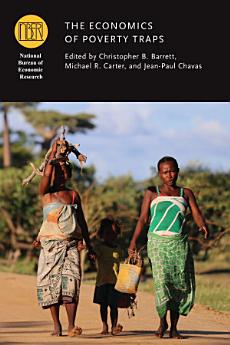The Economics of Poverty Traps
Christopher B. Barrett · Michael R. Carter · Jean-Paul Chavas
Ene 2019 · University of Chicago Press
E-book
414
Mga Page
family_home
Kwalipikado
info
reportHindi na-verify ang mga rating at review Matuto Pa
Tungkol sa ebook na ito
What circumstances or behaviors turn poverty into a cycle that perpetuates across generations? The answer to this question carries especially important implications for the design and evaluation of policies and projects intended to reduce poverty. Yet a major challenge analysts and policymakers face in understanding poverty traps is the sheer number of mechanisms—not just financial, but also environmental, physical, and psychological—that may contribute to the persistence of poverty all over the world.
The research in this volume explores the hypothesis that poverty is self-reinforcing because the equilibrium behaviors of the poor perpetuate low standards of living. Contributions explore the dynamic, complex processes by which households accumulate assets and increase their productivity and earnings potential, as well as the conditions under which some individuals, groups, and economies struggle to escape poverty. Investigating the full range of phenomena that combine to generate poverty traps—gleaned from behavioral, health, and resource economics as well as the sociology, psychology, and environmental literatures—chapters in this volume also present new evidence that highlights both the insights and the limits of a poverty trap lens.
The framework introduced in this volume provides a robust platform for studying well-being dynamics in developing economies.
The research in this volume explores the hypothesis that poverty is self-reinforcing because the equilibrium behaviors of the poor perpetuate low standards of living. Contributions explore the dynamic, complex processes by which households accumulate assets and increase their productivity and earnings potential, as well as the conditions under which some individuals, groups, and economies struggle to escape poverty. Investigating the full range of phenomena that combine to generate poverty traps—gleaned from behavioral, health, and resource economics as well as the sociology, psychology, and environmental literatures—chapters in this volume also present new evidence that highlights both the insights and the limits of a poverty trap lens.
The framework introduced in this volume provides a robust platform for studying well-being dynamics in developing economies.
Tungkol sa may-akda
Christopher B. Barrett is the Stephen B. and Janice G. Ashley Professor of Applied Economics and Management, professor of economics, and International Professor of Agriculture at Cornell University, where he also serves as deputy dean and dean of academic affairs at the S.C. Johnson College of Business.
Michael R. Carter is professor of agricultural and resource economics at the University of California, Davis, and directs the Feed the Future Innovation Lab for Assets and Market Access and the Index Insurance Innovation Initiative (I4). He is a fellow of the Bureau for Research and Economic Analysis of Development and the American Agricultural Economics Association and a research associate of the NBER.
Jean-Paul Chavas is the Anderson-Bascom Professor of Agricultural and Applied Economics at the University of Wisconsin–Madison and a member of the board of directors of the NBER.
Michael R. Carter is professor of agricultural and resource economics at the University of California, Davis, and directs the Feed the Future Innovation Lab for Assets and Market Access and the Index Insurance Innovation Initiative (I4). He is a fellow of the Bureau for Research and Economic Analysis of Development and the American Agricultural Economics Association and a research associate of the NBER.
Jean-Paul Chavas is the Anderson-Bascom Professor of Agricultural and Applied Economics at the University of Wisconsin–Madison and a member of the board of directors of the NBER.
I-rate ang e-book na ito
Ipalaam sa amin ang iyong opinyon.
Impormasyon sa pagbabasa
Mga smartphone at tablet
I-install ang Google Play Books app para sa Android at iPad/iPhone. Awtomatiko itong nagsi-sync sa account mo at nagbibigay-daan sa iyong magbasa online o offline nasaan ka man.
Mga laptop at computer
Maaari kang makinig sa mga audiobook na binili sa Google Play gamit ang web browser ng iyong computer.
Mga eReader at iba pang mga device
Para magbasa tungkol sa mga e-ink device gaya ng mga Kobo eReader, kakailanganin mong mag-download ng file at ilipat ito sa iyong device. Sundin ang mga detalyadong tagubilin sa Help Center para mailipat ang mga file sa mga sinusuportahang eReader.





